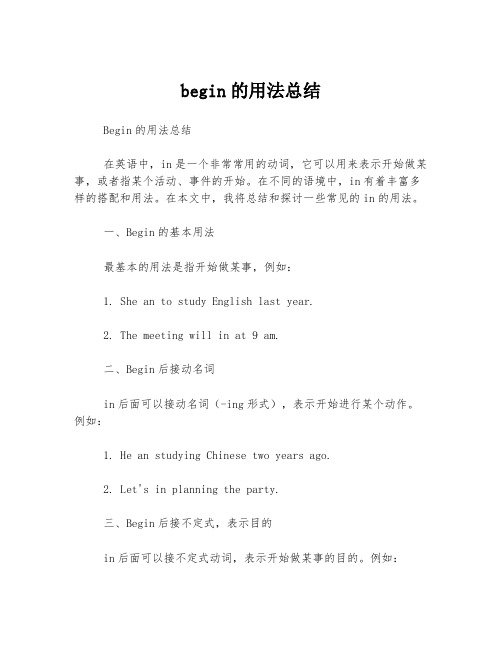begin的用法
- 格式:docx
- 大小:18.93 KB
- 文档页数:2

begin的用法搭配
begin有开始、着手、进行等意思,是一个及物动词,用于表示开始做某件事;反义动词是“end”,意思是停止、结束、完结等。
通常“begin”用于下列结构:
1、begin with + 名词(名词短语、介词短语): 指从一个地方或一件事物开始:
Let’s begin with a review of last week’s lessons.
我们先来复习一下上周的课程吧。
2、begin doing sth. / begin to do sth.:用于表示正式开始做某事:
We will begin doing exercises at 9:00 p.m.
我们将在9:00点正式开始做练习。
5、begin at + 时间:表示从某一时间点开始:
The class will begin at 10 a.m.
这堂课将从上午10点开始。
7、begin by + 动词:表示以动作做开始:
Let’s begi n by writing down our ideas.
我们以写下我们的想法做为开始吧。
总之,“begin”的用法搭配有很多,使用时要根据语境来实际选择。
掌握这些用法后,我们就能在日常交流,乃至书面表达时正确有效地使用begin。

begin的用法合集begin作为一个常用的动词,在英语中有着多种用法和搭配。
以下将介绍begin的几种常见用法和相关短语搭配。
首先,begin常用来表示一个动作或事件的开始。
比如,“He began his speech with a joke”(他以一个笑话开始了他的演讲)。
在这种情况下,begin后面通常会跟随一个名词或动词不定式。
其次,begin也可以表示某个时间点或者某种情况的出现。
例如,“The concert begins at 7 o’clock”(音乐会7点开始)。
“The challenges began to arise as the project progressed”(随着项目的进展,挑战开始出现)。
除此之外,begin还可以用作及物动词,有时也可与介词“with”连用,表示某个动作是以某种方式开始的。
比如,“She began her day with a cup of coffee”(她以一杯咖啡开始了一天)。
此外,begin常与副词连用,表示动作发生的时间或方式。
比如,“The meeting will begin shortly”(会议将很快开始)。
另外一个例子是,“The singer began singing passionately”(歌手开始热情地唱歌)。
对于进行性动词而言,begin通常与现在分词连用,表示一个动作正在进行。
例如,“They began working on the project yesterday”(他们昨天开始着手这个项目)。
在这种情况下,begin后的动词形式是-ing结尾的。
此外,begin还有一些常见的短语搭配,如“begin anew”(重新开始)、“begin with”(以…开始)、“begin to do something”(开始做某事)等。
这些短语搭配的使用可以让句子更具表达力和清晰度。
总的来说,begin作为一个常见动词,有多种灵活的用法和搭配方式。

began和begun的用法1. “Began” is the simple past tense of “begin”. For example, “I began to study for the test yesterday.” It marks the start of an action in the past. Don't you think it's like a door opening to a new chapter?2. “Begun” is the past participle form. Look, “The project has begun.” It shows that an action has already started and might still be ongoing. Isn't it cool how it tells us about an action in progress?3. Remember when we began that adventure? Yup, “began” right there. It brings back memories of that exciting moment. Just like the first step of a great journey!4. And when something has been ongoing since a certain point, we use “begun”. Say, “The construction has begun last month.” Kinda like a story that is unfolding, right?5. Have you ever thought about how “began” makes you feel like you're at the starting line, ready to go? It's as if you're gearing up for something great. For instance, “I began to think about my future.” It's full of possibilities!6. Now, “begun” gives a s ense of continuation. Just like when you say “The movie has begun and I'm really enjoying it”. It makes you feel like you're in the middle of something interesting. Isn't that neat?In conclusion, “began” and “begun” each have their own unique uses and they help us express the timing and progress of actions in a very specific way. They're like the building blocks of our language to describe events precisely.。

名校版高考英语语法考点解析begin类词用法大家在日常的英语学习中或在英语考试中都会遇到:“begin to do sth.”与“begin doing sth.”的相关辨析问题。
很多时候都是模棱两可,含糊不清;像begin, start, continue , cease这样的一些表示开始、继续、结束意义的动词,既可以接带to的不定式,也可以接动名词,粗略地说,意义没有明显的差别。
(begin和start可以视为同义词)Lucy began/started/continued/ceased to write (writing) while in hospital.露西住院时开始(继续,停止)写作。
She began playing / to play table tennis when he was five.她五岁开始打乒乓球。
那么一定要找出这类词的接不定式或动名词的细微差别,那么:1.后接动名词时表示“动作的实际进行”,而接不定式则表示“动作的潜在可能”:He stops talking and begins to eat. 他停止了讲话并要开始吃东西。
He began speaking, and kept on for more than an hour.他开始了讲话,一直讲了一个多小时。
2.后接动名词更倾向于还表示动作的多次性或反复性,但是你硬要后接不定式也不能说错:She began opening all the cupboards.她开始打开所有的食橱柜。
3.不定式既然是表示“即将的,还未进行的,潜在的动作”,那么后接的动词如果是表示心理活动或情感的动词,如像“know”、“understand”、“believe”、“wonder”、“think”等,这些动词则需要用“to do”的形式,不能用“doing”的形式。
如:She began to think she was wrong after a second thought.经过重新考虑后,她开始认为她错了。

begin的用法总结Begin的用法总结在英语中,in是一个非常常用的动词,它可以用来表示开始做某事,或者指某个活动、事件的开始。
在不同的语境中,in有着丰富多样的搭配和用法。
在本文中,我将总结和探讨一些常见的in的用法。
一、Begin的基本用法最基本的用法是指开始做某事,例如:1. She an to study English last year.2. The meeting will in at 9 am.二、Begin后接动名词in后面可以接动名词(-ing形式),表示开始进行某个动作。
例如:1. He an studying Chinese two years ago.2. Let's in planning the party.三、Begin后接不定式,表示目的in后面可以接不定式动词,表示开始做某事的目的。
例如:1. I an to learn cooking so I can make delicious meals.2. He an exercising to improve his health.四、Begin后接名词或代词,表示开始某种状态或关系in后面可以接名词或代词,表示开始某种状态或关系。
例如:1. The movie an production last year.2. We an our friendship in high school.五、Begin在口头语中的使用在口头语中,我们常常用in来引出某个想法或话题。
例如:1. Let me in by saying thank you for inviting me.2. Can I in by asking you a question?六、Begin与start的区别in和start是非常常用的用于表示开始的动词,它们在很多情况下可以互换使用,但它们之间也有一些细微的区别。
例如:1. Begin强调开始的动作的发生,而start强调开始的状态或情况。

begin 用法
begin作为动词,表示开始或着手做某事。
它通常需要后接名词、动名词或从句来说明具体的行动或事件。
1. begin + 名词
例如:I will begin my work at 9 o'clock. (我将在9点开始工作。
)
2. begin + 动名词
例如:She began singing when she was five years old. (她五岁时就开始唱歌了。
)
3. begin + 不定式
例如:We began to learn French last month. (我们上个月开始学法语了。
)
4. begin + 介词短语
例如:The concert will begin with a piano solo. (音乐会将以一首钢琴独奏开始。
)
需要注意的是,begin 还可以作为系动词,表示开始变得某种状态或行为,此时后面应接形容词或副词。
例如:The sky began to darken. (天空开始变暗了。
- 1 -。
begin用法例句关于"begin用法例句"的主题,以下是一篇1500-2000字的文章,逐步回答和解释。
【导言】在英语中,"begin"是一个常见的动词,指示某个行动或活动的开始。
它可以用于不同的情况和语境中,表达各种意思和用途。
本文将详细介绍和探讨"begin"的用法,并提供一些例句进行说明。
【正文】一、"begin"的基本意思与用法1. "begin"的基本意思是指某个行动或活动的开始。
它常用于指示一个新的阶段或某件事情的开端。
例如:- I will begin my presentation with an introduction to the topic. (我会从介绍这个话题开始我的演讲。
)- The movie begins at 7 pm, so make sure you arrive early.(电影在晚上7点开始放映,所以确保你提前到场。
)2. "begin"可以用于表达学习、采取行动或开始进行某个过程。
以下是一些例句:- I want to begin learning a new language this year.(我想今年开始学习一门新的语言。
)- She decided to begin exercising regularly to improve her health. (她决定开始定期锻炼以改善健康状况。
)二、"begin"的不同用法和词组1. "begin with"(以...开始)"begin with"常用来描述一个顺序中的第一个步骤或事物的开始。
例如:- Let's begin with a warm-up exercise before we start the main workout.(在开始主要训练之前,让我们先做一个热身运动。
begin的用法合集
begin的用法主要有以下几种:
1. begin to do sth:这是begin的基本用法之一,表示开始做某事。
这个动作可以是无意识的,也可以是有意识的。
例如:“He began to pace the room.”(他开始在房里走来走去)和“When did you
begin to learn English?”(你什么时候开始学英语的?)
2. begin doing sth:这也是begin的常见用法,表示开始做某事。
但这个动作通常是有意识的。
例如:“He began playing the guitar.”(他开始弹吉他)
3. 当主语不是人,或begin用于进行时,或宾语是表示心理活动的动
词时,最好接动词不定式而不接动名词。
例如:“Its beginning to rain.”(天开始下雨了)和“He began to understand it.”(他开
始明白了。
)
4. begin后接动词不定式表示的动作可以是有意识或无意识的;begin 后接动名词通常表示有意识的动作。
begin用法例句-回复Begin用法例句:1. Begin by selecting the appropriate ingredients for your recipe. (首先,从合适的食材中选择。
)2. Let's begin our meeting with a quick review of last week's progress.(让我们开始会议,先快速回顾上周的进展。
)3. Before we start the project, let's begin by discussing the goals and objectives.(在我们开始项目之前,让我们首先讨论一下目标和目的。
)4. Begin by breaking down the problem into smaller parts and analyzing each one.(要从将问题分解成较小的部分并逐个分析开始。
)5. To become a great writer, you should begin by reading widely and studying various writing styles.(要成为一名优秀的作家,你应该从广泛阅读和学习各种写作风格开始。
)6. Starting a new exercise routine can be overwhelming, so begin by setting realistic goals and gradually increasing intensity.(开始新的锻炼计划可能会让人不知所措,所以先设定现实可行的目标,并逐渐增加强度。
)7. Before you begin a new job, take some time to research the company and understand its culture.(在开始一份新工作之前,请花些时间研究公司并了解其文化。
begin 的用法"begin"是一个动词,意思是开始或着手做某事。
它的一般用法是指开启、起始或着手进行某个活动、任务、过程或事件。
以下是一些使用"begin"的常见用法:1. "begin +名词":用于描述开始进行某项具体的活动或任务。
例如:"I will begin my presentation at 9 o'clock tomorrow."(我明天上午九点开始进行我的演讲。
)2. "begin +动词+ing":用于描述开始某个正在进行的动作。
例如:"The movie is about to begin."(电影即将开始。
)3. "begin + with":用于描述从某个特定项或点开始。
例如:"We will begin with a brief introduction of the topic."(我们将从一个简要介绍主题开始。
)4. "begin + to +动词原形":用于描述开始进行某个动作或行为。
例如:"I began to feel tired after running for an hour."(我跑了一个小时后开始感到累了。
)除了以上常见的用法,"begin"还可以表示开始某种状态、初始阶段、某个期限或事件。
可以根据上下文灵活运用这些用法。
需要注意的是,"begin"是一个不及物动词,通常需要使用它的被动形式或加上宾语。
例如:"The meeting will begin at 10 AM."(会议将在上午十点开始。
)或"We will begin the project next week."(我们下周开始这个项目。
动词begin用法要点
1. 表示开始做某事,其后的动词可用不定式也可用动名词。
如:When did you begin to learn French?
你什么时候开始学法语?
Hearing the news she began to cry .
听到这消息她就哭了。
当begin 后接的是表示心里活动的动词(如think, realize, understand等)或begin本身为-ing形式时,其后通常要接不定式而不接动名词。
如:It is beginning to rain. 开始下雨了。
She began to understand. 她开始明白了。
2. 汉语说“从……开始”,英语一般不用begin from, 而应根据具体情况选用适当的介词。
如:Our journey began at Changsha.
我们的旅行从长沙开始。
The sports meet begins on Monday.
运动会从星期一开始。
3. begin 作为终止性动词,初学者在很多地方容易出错。
如:音乐会已开始半小时了。
误:The concert has begun for half an hour.
正:The concert has been on for half an hour.
3点钟下雨了。
误:It rained at three o’clock.
正:It began to rain at three o’clock.比较:It was raining at three o’clock.。